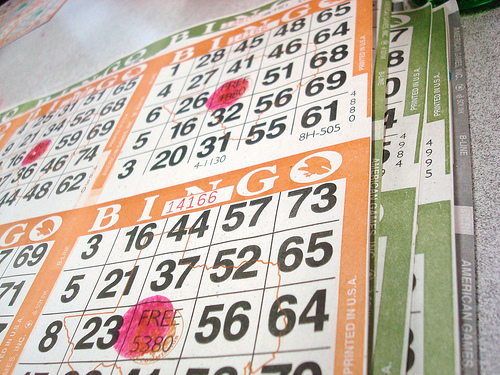History
Despite its massive popularity in the UK, the game of bingo was not invented here. It is, in fact, a descendant of a game which became the first ever national lottery, which was inaugurated in Italy in the 16th century.
However, the French played a big part in modifying the game into the variant which is played commonly in bingo halls and social clubs all over the UK, when they devised a game which involved marking off randomly-generated numbers on a card which contained 15 numbers between 1 and 90.
The fact that the 15 numbers printed on a card are themselves chosen randomly gives an almost infinite number of combinations, and greatly increases the chances of only one person winning each game.
Ironically, the version of bingo which is most commonly played in the UK today became equally popular with both British and French soldiers as a way of passing the time between their fighting duties during the Second World War. It was during this time that an American variant of the game was devised, in which numbers between 1 and 75 were arranged in five rows and columns, each contained any one of 15 numbers. It is this variant of the game which is often found in the seaside amusement arcades of the UK.
Playing bingo for money was legalised in the UK in 1960, and this was the cue for the game to take off on a wide scale. With many cinemas across the country closing, as that pastime dwindled in popularity thanks to the arrival of televisions in most people’s homes, they found a new lease of life as bingo halls, which then became important social centre in many communities, as they offered a way for people to socialise which did not involve spending large amounts of money.
The modern game
The social aspect of bingo is what has ensured that it has survived into the modern, technological age. In an era when presentation, and providing an ‘experience’ for participants, are considered essential elements of a night out, bingo halls have also had to become increasingly welcoming, clean and bright. In turn, this new emphasis on presentation has helped bring in new players, often because they consider a night at the bingo to be a way to escape the humdrum nature of much of their day-to-day lives.
Because everyone begins a game of bingo with the same chance of winning as the next player, yet today large sums are offered in order to allow the game to compete with lotteries, and the game can be played for small stakes, it is popular in itself. But it is undoubtedly the social aspect of the game, in bringing together people from a wide range of backgrounds, which has ensured its survival into an age where so much of life has become about instant gratification and winning.
Citations:
- Flickr Image reference – attribution licence
Jane Pritchard is a freelance writer who specialises in writing around financial topics like instant cash loans.

